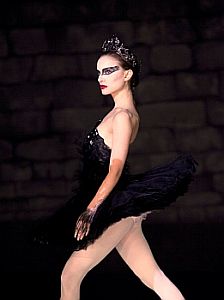 There’s been quite a bit of controversy over Black Swan, the new Darren Aronofsky-directed film starring Natalie Portman as a ballerina descending into madness as she prepares to dance the role of a lifetime and competes with a perceived rival (played by Mila Kunis). Is it good? Is it bad? People seem deeply divided. Manohla Dargis of The New York Times wrote that its got a, “giddy, sometimes sleazy exploitation-cinema savvy.” Some critics have said it’s cliched, others that it’s stunning. The Hollywood Reporter said, “The movie is so damn out-there in every way that you can’t help admiring Aronofsky for daring to be so very, very absurd.”
There’s been quite a bit of controversy over Black Swan, the new Darren Aronofsky-directed film starring Natalie Portman as a ballerina descending into madness as she prepares to dance the role of a lifetime and competes with a perceived rival (played by Mila Kunis). Is it good? Is it bad? People seem deeply divided. Manohla Dargis of The New York Times wrote that its got a, “giddy, sometimes sleazy exploitation-cinema savvy.” Some critics have said it’s cliched, others that it’s stunning. The Hollywood Reporter said, “The movie is so damn out-there in every way that you can’t help admiring Aronofsky for daring to be so very, very absurd.”
When I went to see the movie on Tuesday night the Uptown Theater in Minneapolis had a nice-sized crowd.This despite the fact that it was God-awful cold and parking was a bitch. But, then again, most of us had been trapped in our homes all weekend during the blizzard and were aching to get out. If getting out meant going to see something completely deranged, all the better. We need to take our minds off the fact that we are completely deranged for living in such brutal conditions. It’s always fun to watch people crazier than you are. Much more fun, by the way, than watching a preview of Nicole Kidman and Aaron Eckhart alternately cry and yell at each other in a preview for thefilm Rabbit Hole.
There used to be commercials for movies that were about to come out in which they caught people on camera as they left the theater to get their reactions. They would stare into the bright lights and say things like, ” This movie changed my world view,” or “I want to see it 30 more times.” If some camera crew had caught me on the way out of the theater, I would have said, “What the fuck was that?” or maybe, “If you love Showgirls, you’ll love Black Swan.”
This might sound like a negative review. It is not. I happen to wholeheartedly love Showgirls. But it’s taken me a few days to parse out what I think of Black Swan and I’ve decided that I find it to be one of the more interesting things I’ve seen all year. I love it because it’s a puzzle. What was real? What was in Nina’s mind? There is a big question about whether some of the characters even existed. I don’t want to reveal too much about the movie but I’m seriously questioning whether or not Nina’s mother, played by Barbara Hershey, even existed.
I hate being spoon fed a movie. “Here, open wide, it’s a heaping pile of ‘cute girl. Now, open wide again, here’s an overloaded utensil of cute guy. OMG! Will they get together in the end?”
No. In general, I like my movies to have a dark side. I want to be surprised. Surprise the audience, isn’t that one of the mantras given to actors? And this movie does not disappoint. It gets right into it and doesn’t really let up with it’s weirdness until the final frame. Thank you, Darren, for making something daring, bold and, yeah, slightly flawed.
Sure, sometimes it goes over the top. I would find myself laughing and then think, “Wait, am I supposed to laugh here?” Case in point: every scene with Winona Ryder in it. Lady ain’t shy about chewing the scenery. But even this seems like a stroke of genius – who better to play Beth, the washed up prima ballerina, than a washed up actress, finished before her prime? I see Winona Ryder on the screen and I think, “Well, at least she’s getting out of the house.”
And casting Natalie Portman in the role of Nina, the beautiful waif who is overly-dedicated and one-dimensional in her pursuit of her dancing career, is also genius. I’ve enjoyed Natalie Portman in a number of films but she definitely possesses a streak of chilliness, a remove from the rest of us. She is dainty and proper and beautiful and yet… somehow there is a void where true passion and vitality should be. Not that it doesn’t exist somewhere deep inside, which is the entire point of the film, but rather that’s she’s withholding it from the world and, ultimately, from herself.
Getting back to those moments of laughter – it begs the question of whether or not every dark story demands a complete lack of levity. Certainly this is not true in real life. But apparently it was true of earlier Darren Aronofsky fare, who made the film Requiem For a Dream. I’ve never seen it, warned off it by a number of people who said it will only make me want to curl up in a corner for a few days. Anyway, perhaps those moments were not intentional, but they help keep the audience guessing and slightly off-balance. One minute we’re laughing at how creepy and odd Nina’s mother is and then next we’re cringing as mommy takes a scissors to Nina’s nails (echoes of Mommy Dearest). One minute there’s an awkward scene between Nina and her artistic director in which he’s asking her if she’s a virgin and if she masturbates and the next she’s peeling a strip of skin off her finger or feathers are threatening to pop out of her skin. And, best of all, just when you think Nina is a robot programmed only to dance and be the good girl, she comes out with a one-liner that makes the audience gasp or giggle.
Black Swan offers up a commentary on something everyone struggles with – balance. If you’re an artist or a writer, you know that you can sometimes create something that seems so foreign to your day-to-day personality that it frightens you. You might think, “I painted that picture of the tree eating the little boy?” or “I wrote that brutally awkward sex scene?” It can seem as if your deepest expressions are things you should hide from other people, sheltering them from your perverse oddity.
We all strive for perfection on some level, if not in our work then in our hobbies, trying to be the best biker, skier, golfer, seamstress, potter, etc. But what happens when you strive for perfection, for that perfect light, with no allowance for fuck-ups, darkness and detours? What happens if you can’t meld the two or allow them to co-exist? What if you’re perfect in executing but there’s no passion? Or what if your release of passion threatens to overcome you and take away your ability to function in the wider, every day world? And so Black Swan becomes a story within a story within a story – it’s the story of the Black Swan on stage and the story of the Black Swan (Nina) offstage and its the story of Aronofsky’s attempt to capture the Black Swan on film- perfect in execution, but striving to convey passion for the story and for art and what it means to be an artist. Or even to be a human being. Because, lived to its fullest, every life can become an art project if we just get out of our own way.

I think her mother doesn’t exist.
Have you noticed girl/woman with a blood nightdress that Nina “sees”(at 1:23:22) and that it seems to be the same girl in a picture that her mother is drawing (at 24:13)?